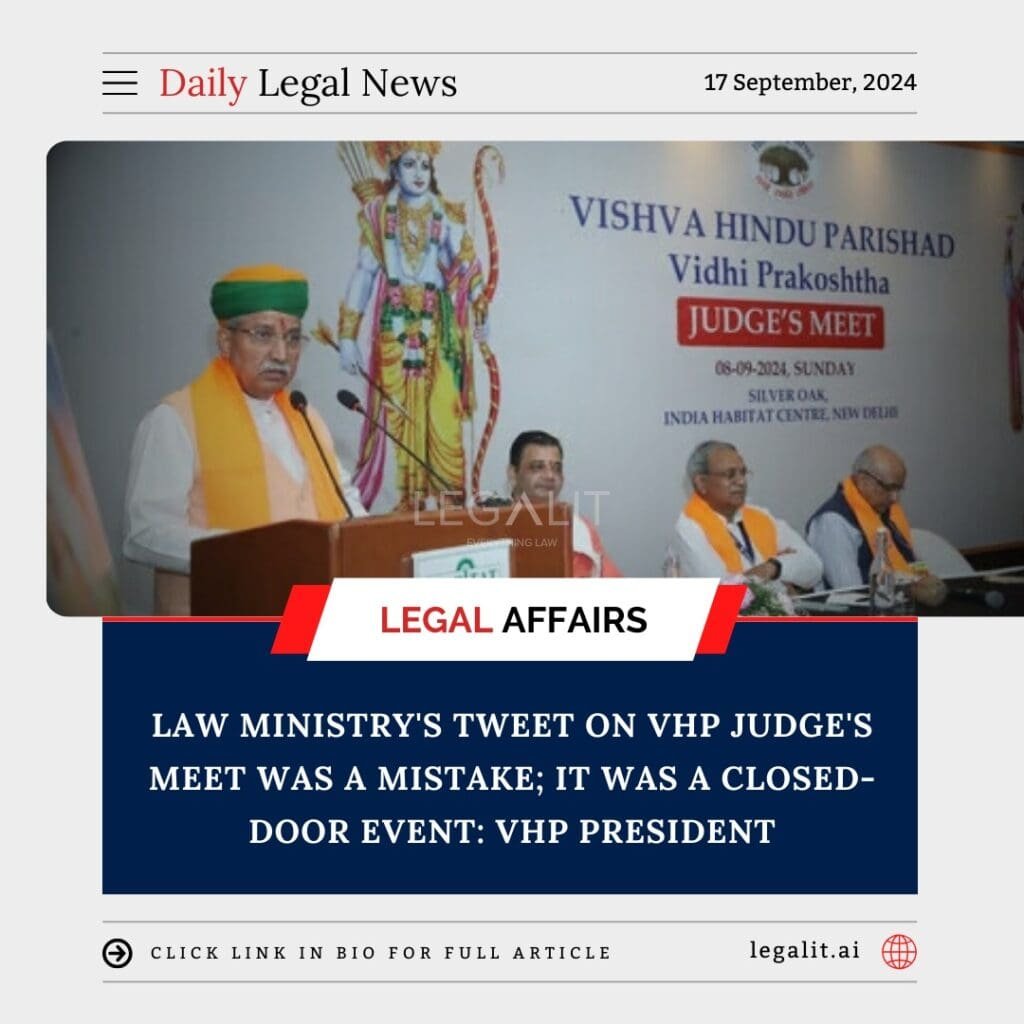
In a recent controversy, the Vishva Hindu Parishad (VHP) President clarified that the Law Ministry made an error by tweeting about a closed-door meeting of judges hosted by the VHP. The event, which was intended to be private, drew widespread attention after the Law Ministry publicly acknowledged it on social media, sparking concerns about the nature of the discussions and the potential implications for judicial independence.
Background of the Controversy
The closed-door meeting, organized by the VHP, reportedly involved several high-ranking judges and was meant to be a private gathering to discuss legal issues concerning the Hindu community. However, the Law Ministry, in what the VHP described as a “mistake,” tweeted about the event, inadvertently bringing the meeting into the public eye. The tweet led to speculation and criticism from various quarters, questioning the appropriateness of such a meeting between a religious organization and members of the judiciary.
VHP President’s Statement
The VHP President, while addressing the media, emphasized that the meeting was a private affair, meant to be a closed-door discussion, and not intended for public dissemination. He stated that the Law Ministry’s decision to tweet about the event was an unintended error that led to unnecessary controversy.
- Clarification on the Meeting’s Nature: According to the VHP President, the meeting was aimed at discussing matters related to the Hindu community’s legal concerns and was not meant to influence or interfere with the judiciary. He reassured the public that the gathering was a routine event, similar to those held by various religious and social organizations with different sectors of society, including the judiciary.
- Concerns Over Public Disclosure: The VHP President expressed concern over the Law Ministry’s public disclosure of the event, as it was supposed to be confidential. He noted that the meeting’s privacy was crucial to ensure open and candid discussions among the participants. The tweet, however, gave the impression that the event was being held with a different purpose, leading to unnecessary political and social speculation.
Public Reactions and Criticism
The tweet by the Law Ministry drew significant public and political attention, with many questioning the appropriateness of judges attending a meeting hosted by a religious organization. Critics argued that the judiciary must maintain an appearance of impartiality, and such private meetings with religious groups could raise questions about judicial independence and integrity.
- Concerns About Judicial Independence: Several commentators pointed out that while judges are free to meet and discuss legal issues, attending a meeting organized by a religious body like the VHP could create a perception of bias. This perception, they argued, could erode public trust in the judiciary’s impartiality, especially given the sensitive nature of legal issues related to religion in India.
- Calls for Transparency: Some legal experts and political figures have called for more transparency in such interactions between the judiciary and outside groups, particularly religious or political organizations. They stressed that any engagement involving judges should be conducted in a manner that upholds the principles of transparency and judicial independence.
Law Ministry’s Response
As of now, the Law Ministry has not issued a formal statement addressing the tweet or the controversy surrounding it. However, sources within the ministry suggested that the tweet was an inadvertent mistake and not an attempt to publicize a private event. The tweet was later deleted, but not before it had already sparked widespread debate.
Conclusion
The VHP President’s clarification that the Law Ministry’s tweet on the judges’ meeting was a mistake highlights the delicate balance between public perception and the judiciary’s independence. While the meeting may have been routine in nature, its unintended disclosure has raised questions about the appropriateness of such engagements and the need for maintaining transparency in the judiciary’s interactions with external groups. This incident serves as a reminder of the sensitivity surrounding the judiciary’s role and the importance of ensuring that public trust in its impartiality remains intact.